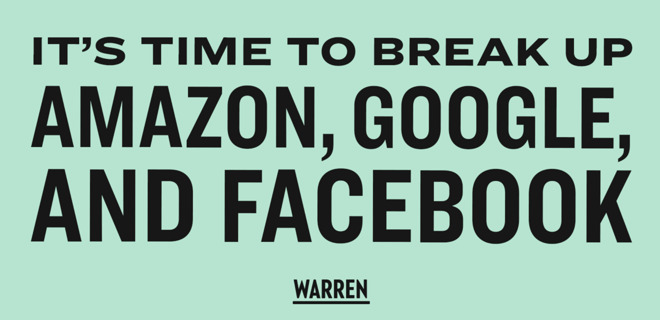Speaking at SXSW, presidential candidate and Senator Elizabeth Warren explicitly called out Apple's App Store as one example of what would need to be split away from the company to comply with her big tech breakup plan, if Apple wanted to continue to distribute its own apps and services.

After Warren announced her plan on Friday, more details have emerged regarding specifics of the plan. Speaking at SXSW on Saturday, Warren confirmed that Apple was on the list for breakup, and discussed the matter in some detail.
"Apple, you've got to break it apart from their App Store. It's got to be one or the other," Warren said when specifically asked about Apple. "Either they run the platform or they play in the store. They don't get to do both at the same time. So it's the same notion.
When Nilay Patel from The Verge reminded Warren that control of the App Store is how Apple keeps the iPhone secure, Warren danced around the question.
Well, are they in competition with others who are developing the products? That's the problem all the way through this, and it's it's what you have to keep looking for.If you run a platform where others come to sell, then you don't get to sell your own items on the platform because you have two comparative advantages. One, you've sucked up information about every buyer and every seller before you've made a decision about what you're going to to sell. And second, you have the capacity -- because you run the platform -- to prefer your product over anyone else's product. It gives an enormous comparative advantage to the platform.
Neither Apple, nor Google, Facebook, or Amazon have commented on the matter as of yet. At present, it isn't clear if Warren is going to float the regulatory idea now, or wait until after the 2020 election has concluded.
While Warren didn't call out Apple by name in her initial announcement about the plan on March 8, Apple very clearly was included in the parameters for break-up.
Companies with an annual global revenue of $25 billion or more and that offer to the public an online marketplace, an exchange, or a platform for connecting third parties would be designated as "platform utilities."These companies would be prohibited from owning both the platform utility and any participants on that platform. Platform utilities would be required to meet a standard of fair, reasonable, and nondiscriminatory dealing with users. Platform utilities would not be allowed to transfer or share data with third parties.
In Saturday's interview with The Verge, Warren reiterated her reminders that Microsoft was forced to loosen control on web browsers, and breakups of monopolies by AT&T, J.P. Morgan, and Standard Oil were instrumental in establishing the modern business landscape.


